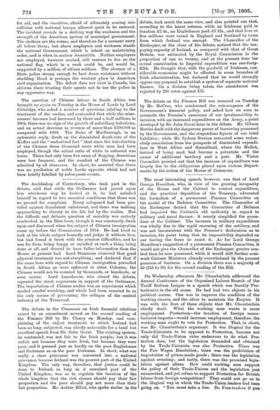The debate in the Commons on Irish financial relations raised
by an amendment moved on the second reading of the Finance Bill by Mr. Clancy on Monday, and com- plaining of the unjust treatment to which Ireland had been so long subjected, was chiefly noticeable for a brief but excellent speech from Sir John Gorst. The existing system, he contended, was not fair to the Irish people; but it was unfair not because they were Irish, but because they were poor, and it pressed just as hardly on the poor Englishman and Scotsman as on the poor Irishman. In short, what was really a class grievance was converted into a national grievance, because Ireland was the poorest part of the United Kingdom. The only way, therefore, that justice could be done to Ireland, as, long as it remained part of the United Kingdom, was so to regulate the taxation of the whole kingdom that the rich classes should pay their fair proportion and the poor should pay not more than their fair proportion. Mr. Arthur Elliot, who spoke earlier in the debate, took much the same view, and also pointed out that, according to the latest returns, while an Irishman paid in taxation £2 4s., an Englishman paid £3 12s., and that four or five millions were raised in England and Scotland by taxes from which Ireland was exempt. The Chancellor of the Exchequer, at the close of the debate, noticed that the tax- paying capacity of Ireland, as compared with that of Great Britain, was estimated by the Royal Commission in the proportion of one to twenty, and at the present time her actual contribution to Imperial expenditure was one-forty- fifth. He thought that, with the goodwill of Irishmen, con- siderable economies might be effected in some branches of Irish administration, but declared that he would strongly oppose any proposal to establish a system of separate national finance. On a division being taken, the amendment was rejected by 238 votes against 155.






































 Previous page
Previous page